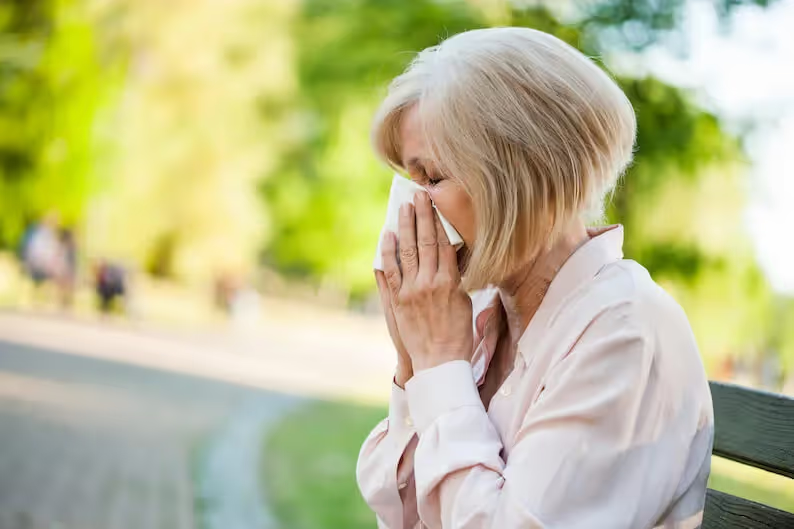Spring is a beautiful time of the year – birds chirping, colorful budding flowers, blooming trees. But if you're one of the 50 million Americans who suffer from seasonal allergies, you probably have a hard time seeing the beauty each year. Seasonal allergies, also referred to as hay fever or allergic rhinitis, can be painful and miserable. Sneezing, runny nose, congestion, itchy eyes. Nothing fun about those symptoms. Common treatments for seasonal allergies include steroid shots, antihistamines, and nasal decongestants. Yes, these treatments may offer relief, but they can also be costly and leave you with some uncomfortable and unwanted side effects, such as drowsiness. Fortunately, there are some home remedies for seasonal allergies you can try if you're looking for a new way to combat the pesky condition.
Acupuncture
Acupuncture is a Chinese healing practice that originated over 5,000 years ago. This popular complementary healing method has slowly made its way to the West to treat an array of health problems, including seasonal allergies. Studies have found acupuncture to relieve hay fever symptoms in replacement of antihistamines. With acupuncture, very thin needles are placed in specific points on the body called "acupuncture points." Electrical stimulation is then achieved through gentle movements of the practitioner's hands. This practice is believed to restore the flow of energy in the body, thus eliminating pain and other ailment symptoms. You should always have this alternative treatment performed by a license acupuncturist.
Essential Oils
Essential oils have become a popular natural remedy for various ailments, including seasonal allergies. It may seem like a fairly new-age treatment, but the use of essential oils dates back as early as 4500 BC. There are records that ancient Egyptians used oils for medicinal purposes. It makes you wonder why it took us so long to incorporate the treatment into our medicinal repertoire. Breathing in the oils' scents is known as aromatherapy. When you breathe in a smell, you're stimulating your body. Essential oils are natural and safe; however, it's important to listen to your body. Everyone reacts to essential oils differently. So, listen to your body and dilute more if needed. When it comes to which essential oils to use and when you'll find a wide variety to choose from depending on what you're trying to treat. Each oil has its own healing properties. For example, eucalyptus oil helps with inflammation and to relieve congestion resulting from seasonal allergies. In addition, eucalyptus has a cooling sensation when you breathe it in and may help provide some much-needed relief. Peppermint and tea tree oil are also anti-inflammatories that can aid in providing relief from allergies. And in addition, lemon and other citrus-scented essential oils help clear sinuses and provide a little boost in energy and alertness.
Eat Fish
Sounds crazy, right? But research has found that omega-3 fatty acids help to reduce inflammation in the body, which plays a major role in allergies. Specifically, omega-3 fatty acid has been shown to ease stuffiness and reduce nasal swelling by aiding in the production of prostaglandins, the group of lipids responsible for controlling inflammation. The American Heart Association suggests eating at least two servings of fatty fish a week. Salmon, tuna, and mackerel are all great sources of omega-3s. If fish isn't really your thing, you can also reap the benefits and get your fatty acids via walnuts, vegetable oil, omega-3 supplements, or flax seeds.
Nasal Irrigation
Nasal irrigation, also called nasal rinse, is a method to flush out clogged nasal passages. This is done using nasal irrigation devices known as neti pots. The neti pot is an Ayurvedic remedy that people have used for thousands of years in India. The device looks like a small teapot with a long spout and uses saline or saltwater solutions to gently cleanse the nasal passages. You perform nasal irrigation by filling the neti pot with water and inserting the spout in one nostril. You then turn your head to the side and pour the water into the passageway, allowing it to flow out the other side. The water gently cleanses the nasal passages of dirt, pollen, and mucus. You can perform nasal irrigation daily You can also safely perform nasal irrigation with bulb syringes, squeeze bottles, and battery-operated pulsed water devices. However, it's important to note that you should never use tap water to perform this treatment. Bacteria can linger in tap water. Therefore, if tap water is your only solution, you should boil it first.
Get Seasonal Allergy Relief With Complimentary Methods
Alternative treatment methods are not for everyone. Before trying anything new, it's important that you discuss your options with your provider. Depending on the severity of your allergies, you can combine home remedies for seasonal allergies with your traditional medicine to achieve positive results. If you suffer from seasonal allergies, contact your provider today and find out if home remedies are right for you.




